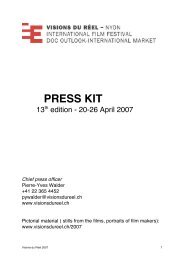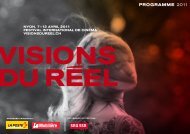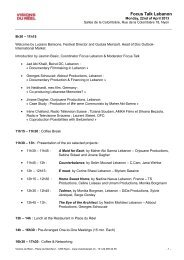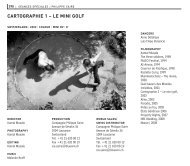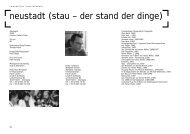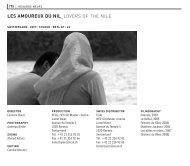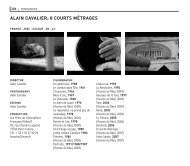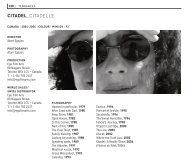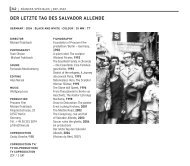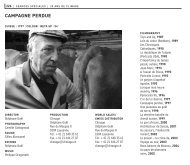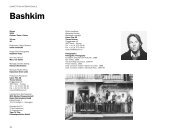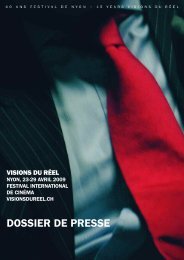Katalog 2013.pdf - Visions du Réel
Katalog 2013.pdf - Visions du Réel
Katalog 2013.pdf - Visions du Réel
You also want an ePaper? Increase the reach of your titles
YUMPU automatically turns print PDFs into web optimized ePapers that Google loves.
116 helvétiques<br />
Frédéric Baillif<br />
Tant qu’il pleut<br />
en Amérique<br />
Switzerland | 2013 | 90’ | XD CAM | Amharic, English, French<br />
As long as it rains in America<br />
World Premiere<br />
Cinematography<br />
Frédéric Baillif<br />
Sound<br />
Jürg Lempen<br />
Editing<br />
Janine Waeber,<br />
Valentin Waeber<br />
Pro<strong>du</strong>ction<br />
Florence Adam<br />
(JMH SA)<br />
Selected Filmography<br />
2013 Tant qu’il pleut en<br />
Amérique<br />
2010 Believers (mlf)<br />
2009 Petit frère (sf)<br />
2009 La vie en 2<br />
2009 Le fond et la forme<br />
2006 Geisendorf<br />
2003 Sideman<br />
2001 The It Factor (sf)<br />
En 1985, comme tant d’autres, le réalisateur<br />
genevois Frédéric Baillif (avec<br />
Geisendorf, 2006 et La vie en 2, 2009,<br />
<strong>Visions</strong> <strong>du</strong> Réel) acheta le single de « We<br />
are the World » par USA for Africa. En<br />
chantant contre la famine en Afrique, les<br />
stars de la pop cristallisèrent l’image de<br />
l’enfant éthiopien sous-alimenté. Baillif<br />
décide de proposer une image personnelle<br />
et moderne qui va à l’encontre de<br />
ce stéréotype. Il part donc – quelque peu<br />
déconcerté par les jolies femmes qui à<br />
l’époque divertissaient déjà les soldats<br />
italiens de la <strong>du</strong>re réalité de la guerre –<br />
à la rencontre de nombreux Ethiopiens<br />
et de leurs conditions de vie : de jeunes<br />
entrepreneurs citadins qui ont étudié à<br />
l’étranger, des enfants qui travaillent, un<br />
rasta, ou encore un professeur militant.<br />
On comprend alors mieux pourquoi les<br />
Ethiopiens sont, aujourd’hui encore, si<br />
dépendants de l’aide alimentaire et comment<br />
les ONG et les pays en tirent profit.<br />
Face à cela, une grande partie de la<br />
population se réfugie dans la religion, les<br />
feuilles de kath ou le café. Baillif partage<br />
ses impressions au moyen de commentaires<br />
personnels. Sur la route, au rythme<br />
de la musique, les échos de ce roadmovie<br />
se gravent dans les mémoires.<br />
Der Genfer Filmemacher Frédéric Baillif<br />
(mit Geisendorf (2006) und La vie en<br />
2 (2009) bei <strong>Visions</strong> <strong>du</strong> Réel) kaufte<br />
sich 1985, wie viele andere auch, die<br />
Single «We are the World» von USA<br />
for Africa. Die Popstars, die gegen die<br />
Hungersnot in Afrika sangen, festigten<br />
damit auch das Bild des hungernden<br />
Kindes in Äthiopien. Um diesem stereotypen<br />
Bild ein eigenes und zeitgenössisches<br />
entgegenzusetzen, macht sich<br />
Baillif auf eine Reise und lernt – etwas<br />
verwirrt von den schönen Frauen, die<br />
damals schon die italienischen Soldaten<br />
vom Krieg ablenkten – viele Äthiopier<br />
und ihre Lebensumstände kennen:<br />
Urbane Jungunternehmer, die im Ausland<br />
studiert haben, arbeitende Kinder,<br />
ein Rastamann oder ein politisch aktiver<br />
Professor. Es wird klarer, weshalb<br />
Äthiopien heute noch von Nahrungsmittelhilfe<br />
abhängig ist und wie die<br />
helfenden Länder und NGOs davon profitieren.<br />
Derweil trösten sich weite Teile<br />
der Bevölkerung mit Religion, Kathblätter<br />
und Kaffee. Mit einem persönlichen<br />
Kommentar reflektiert Baillif seine Eindrücke,<br />
zu Musik und Autofahrt prägen<br />
sich die Impressionen dieses Roadmovies<br />
im Gedächtnis ein.<br />
Like many other people, Geneva-based<br />
filmmaker Frédéric Baillif (Geisendorf,<br />
2006 and La vie en 2, 2009, at <strong>Visions</strong><br />
<strong>du</strong> Réel) bought the single ‘We are the<br />
World’ by USA for Africa in 1985. The pop<br />
stars who sang to eliminate the famine<br />
in Africa thus strengthened the image of<br />
the starving child in Ethiopia. To counter<br />
this stereotypical image with his own,<br />
contemporary one, Baillif goes on a journey<br />
and, despite being a little confused<br />
by the beautiful women who formerly<br />
even distracted Italian soldiers from the<br />
war, gets to know many Ethiopians and<br />
their circumstances: Urban entrepreneurs<br />
who have studied abroad, working<br />
children, a Rasta man and a politically<br />
active professor. It becomes clearer why<br />
Ethiopia is still dependent on food aid<br />
today, and how the aid-giving countries<br />
and NGOs benefit from this. Meanwhile,<br />
large parts of the population console<br />
themselves with religion, khat leaves<br />
and coffee. With a personal commentary,<br />
Baillif reflects on his impressions, and the<br />
music and driving ingrave our impressions<br />
of this road movie on our memory.<br />
Contact<br />
Matthieu Henchoz<br />
JMH Distributions SA<br />
+41 327290020<br />
societes@jmhsa.ch<br />
www.jmhsa.ch<br />
Jenny Billeter



